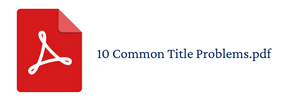Title Insurance
Title insurance protects against problems affecting the title to your home. There are two types of title insurance—a Lender's Policy and an Owner's Policy.
If you obtain a loan (even a refinance of your current home) the Lender will require that you purchase a Lender’s Title Policy to protect their investment in your property. This coverage protects only the Lender against defects in title in the event the Lender acquires an interest in your property through foreclosure.
The Lender’s Policy does not cover your equity in the property and will not pay your legal expenses if there is a problem. Only an Owner’s Title Insurance Policy will protect you, the property owner, from defects in title that could have a significant impact on your interest in the property and its marketability.
Should a covered title issue arise, the title insurance company will hire counsel and pay the cost of defense, even if the lawsuit has no merit. If you incur a loss as a result of the suit, you will be covered up to the value of the policy, which is usually the purchase price of your property.
If you are not financing the purchase of your home, then an Owner’s Policy becomes that much more valuable.
Far less than expensive lawsuits and legal advice, the one time Owner’s Title Insurance premium is simply the best protection for you and your heirs against the unforeseen.
Hidden Risks
Hidden risks are potential title problems that even the most thorough examination by the most experienced team of title search professionals may not uncover until months or even years after a property is sold. The end result can be loss of property, costly lawsuits and, of course, delayed closings.
Title companies find problems in 25% of their title searches. These may include:
- Undischarged prior mortgages
- Improperly signed documents
- Tax, Current use, or Mechanics’ lien
Other issues that can cloud title and are not so easy to detect include hidden risks such as:
- Clerical errors in public records
- Forged deeds, mortgage releases or other forged documents
- Deeds made by persons of unsound mind, dementia, or Alzheimer’s
- Deeds made by minors
- Falsification of records, fraud
- Undisclosed or missing heirs
- Improper legal description
- A deed executed using an expired power of attorney
- Title taken as a result of an improperly probated will
- False representation of the true owner of the property
- Improperly indexed liens on property
- Misrepresentation of marital status
- Unpaid taxes
Do Claims Occur?
Leading title insurance companies have investigated, defended, and paid losses in the following categories:
| 38% | Hidden defects in the Title, hidden restrictions, covenants |
| 27% | Taxes, assessments, assoc. fees |
| 16% | Searching and closing errors |
| 10% | Undischarged mortgages and lien |
| 7% | Legal access, undisclosed heirs, invalid condo |
| 2% | Errors in the Registry of Deeds |
Why an Owner's Policy?
An Owner’s Policy insures against title defects that are not covered by an attorney’s certification of title. An attorney’s certification of title is an opinion of the quality of the “record” title based on a review of the public records at the registries of deeds and probate. However, the certifying attorney may not be responsible for numerous title defects that would not be found, despite the most thorough search of public records such as those hidden risks listed above.
Call us today or contact a member of our knowledgeable staff to answer any questions you may have regarding title search and real estate settlement services.
10 Common Title Problems
Review the following document to learn more about some of the common title issues that may be discovered through a title search or become known after you close your transaction.

